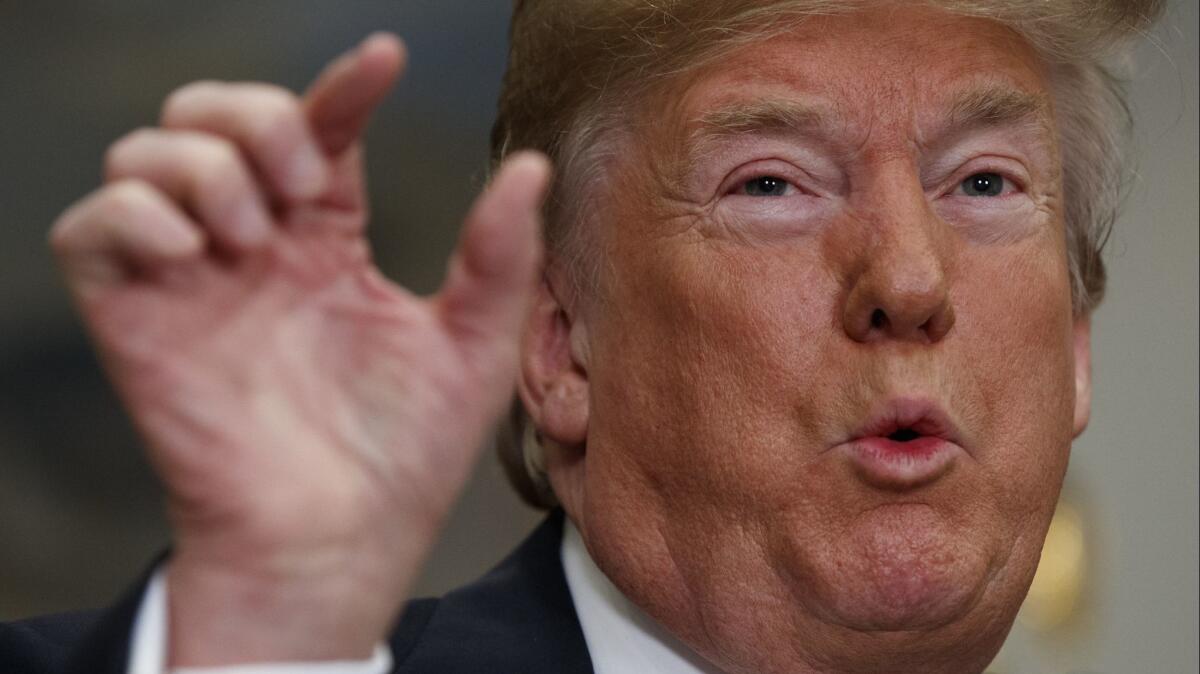Editorial: The North Korea summit has been canceled. Is anyone surprised, given what an unholy mess it was?

- Share via
Seriously, is anyone really shocked that the much-discussed, much-heralded Summit of the Century between President Trump and North Korean leader Kim Jong Un has been canceled?
From the start, this highly unusual meeting of the minds was undertaken in an unorthodox way, to put it mildly. Negotiated often by tweet and news communique rather than through established diplomatic channels, it began with threats and name-calling. Trump sought laughs from his base by dismissing the North Korean leader as “Little Rocket Man,” and Kim responded by calling Trump a “mentally deranged U.S. dotard.” When Kim referred to a Trump speech as “reckless remarks by an old lunatic,” Trump asked, “Why would Kim Jong-un insult me by calling me ‘old,’ when I would NEVER call him short and fat?”
But while these puerile insults were bandied about to the amusement of the world, there were also real threats of serious violence by players who at least in theory had the power to follow through if they chose to. Trump said ominously that “military solutions are now fully in place, locked and loaded.” He threatened to unleash “fire, fury and frankly power, the likes of which this world has never seen before.” In one speech, he vowed to “totally destroy North Korea.” Kim made equally rash threats. “The United States should know that the button for nuclear war is on my table,” he said. “The entire area of the U.S. mainland is within our nuclear strike range.”
Then, suddenly, the mood veered. Out of nowhere there was a summit on the table, and the two irresponsible saber-rattlers became unlikely besties. “There is a good chance that Kim Jong Un will do what is right for his people and for humanity,” tweeted a born-again Trump. He said he believed North Korea would honor its commitment not to conduct a missile test. This was such a “very special moment for World Peace,” as Trump put it, that an official commemorative coin was minted with a image of Trump and Kim face to face. Three American hostages were released, and Trump reveled in the ludicrously premature suggestion that he might win a Nobel Peace Prize.
This much seems obvious: Veering wildly back and forth between belligerence and excessive flattery is not the way smart diplomacy is undertaken.
Until things turned ugly again, with Trump administration officials warning that North Korea might follow Libya into ruin and regime change and a top North Korean diplomat raising the possibility of a “nuclear-to-nuclear showdown.”
This much seems obvious: Veering wildly back and forth between belligerence and excessive flattery is not the way smart diplomacy is undertaken. Of course there’s an element of carrot-and-stick in any negotiation, and some posturing is often part of the game as well. But over time, the pursuit of meaningful foreign policy achievements requires substantially more than bluster. It requires an understanding of your adversary and your adversary’s interests. It requires the setting of goals for both the short-term and the long-term. It requires a clear-eyed assessment of the costs and benefits of numerous possible outcomes. It requires consistency, stability, credibility, authority — and above all, it requires a long-term strategy.
A top North Korean official sounded a conciliatory note Thursday afternoon, saying Kim was ready to meet Trump “at any time.” Still, it’s not at all clear that the conditions are set for them to meet successfully.
Does the Trump administration have a strategy beyond “give us what we want or we will punish you”? Has it made use of the (increasingly depleted) State Department foreign policy bureaucracy to help determine what would constitute success in negotiations with Kim? Did it rush too hastily into a summit for which it was unprepared? Has it gathered the necessary intelligence to understand what the notoriously mercurial North Koreans would need to achieve? Has it considered whether it would be better to have preparatory staff and ministerial-level meetings before putting the leaders together in a room with ambitious goals? Has it kept its expectations tempered and realistic?
Trump says “positive things” and “constructive dialogue” with North Korea may still be achievable. We certainly hope that is the case. Diplomacy, after all, is almost always worth trying — especially when the alternative is military action. But if and when talks begin again with Kim’s regime, they should be handled with less theatrics, more deliberation and a rational plan to resolve this festering, seven-decade-old conflict.
Follow the Opinion section on Twitter @latimesopinion and Facebook
More to Read
A cure for the common opinion
Get thought-provoking perspectives with our weekly newsletter.
You may occasionally receive promotional content from the Los Angeles Times.









